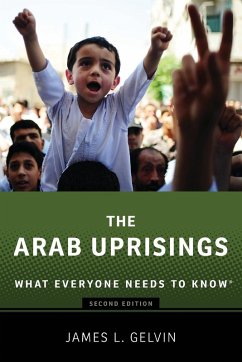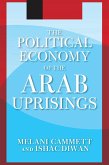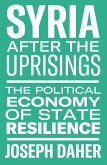21,99 €
inkl. MwSt.
Sofort lieferbar

11 °P sammeln
- Broschiertes Buch
- Merkliste
- Auf die Merkliste
- Bewerten Bewerten
- Teilen
- Produkt teilen
- Produkterinnerung
- Produkterinnerung
The Arab Uprisings: What Everyone Needs to Know¿ answers readers' questions about the history and current state of the Arab world and addresses all aspects of the uprisings of 2010 to 2011.
Andere Kunden interessierten sich auch für
![Violence and Representation in the Arab Uprisings Violence and Representation in the Arab Uprisings]() Benoît ChallandViolence and Representation in the Arab Uprisings112,99 €
Benoît ChallandViolence and Representation in the Arab Uprisings112,99 €![Egyptian Diaspora Activism During the Arab Uprisings Egyptian Diaspora Activism During the Arab Uprisings]() Lea Müller-FunkEgyptian Diaspora Activism During the Arab Uprisings201,99 €
Lea Müller-FunkEgyptian Diaspora Activism During the Arab Uprisings201,99 €![The Political Economy of the Arab Uprisings The Political Economy of the Arab Uprisings]() Melani CammettThe Political Economy of the Arab Uprisings193,99 €
Melani CammettThe Political Economy of the Arab Uprisings193,99 €![Syria After the Uprisings Syria After the Uprisings]() Joseph DaherSyria After the Uprisings75,99 €
Joseph DaherSyria After the Uprisings75,99 €![After the Arab Uprisings After the Arab Uprisings]() Shamiran MakoAfter the Arab Uprisings94,99 €
Shamiran MakoAfter the Arab Uprisings94,99 €![Social Movements and Globalization Social Movements and Globalization]() Cristina Flesher FominayaSocial Movements and Globalization49,99 €
Cristina Flesher FominayaSocial Movements and Globalization49,99 €![Lebanon and the Arab Uprisings Lebanon and the Arab Uprisings]() Lebanon and the Arab Uprisings234,99 €
Lebanon and the Arab Uprisings234,99 €-
-
-
The Arab Uprisings: What Everyone Needs to Know¿ answers readers' questions about the history and current state of the Arab world and addresses all aspects of the uprisings of 2010 to 2011.
Hinweis: Dieser Artikel kann nur an eine deutsche Lieferadresse ausgeliefert werden.
Hinweis: Dieser Artikel kann nur an eine deutsche Lieferadresse ausgeliefert werden.
Produktdetails
- Produktdetails
- Verlag: OUP US
- Seitenzahl: 226
- Erscheinungstermin: 16. Februar 2015
- Englisch
- Abmessung: 210mm x 140mm x 12mm
- Gewicht: 283g
- ISBN-13: 9780190222758
- ISBN-10: 0190222751
- Artikelnr.: 42431103
- Herstellerkennzeichnung
- Books on Demand GmbH
- In de Tarpen 42
- 22848 Norderstedt
- info@bod.de
- 040 53433511
- Verlag: OUP US
- Seitenzahl: 226
- Erscheinungstermin: 16. Februar 2015
- Englisch
- Abmessung: 210mm x 140mm x 12mm
- Gewicht: 283g
- ISBN-13: 9780190222758
- ISBN-10: 0190222751
- Artikelnr.: 42431103
- Herstellerkennzeichnung
- Books on Demand GmbH
- In de Tarpen 42
- 22848 Norderstedt
- info@bod.de
- 040 53433511
James L. Gelvin is Professor of Modern Middle Eastern History at the University of California, Los Angeles. He is the author of The Modern Middle East: A History and The Israel-Palestine Conflict: One Hundred Years of War.
* ACKNOWLEDGMENTS
* 1 A Revolutionary Wave?
* What is the Arab world?
* Is the Arab world homogeneous?
* Why do Arabs identify with one another?
* What was political life in the Arab world like on the eve of the
uprisings?
* Why have authoritarian governments been so common in the Arab world?
* What was the state of the economy in the Arab world on the eve of the
uprisings?
* What benefits did Arab regimes originally promise their populations?
* Why and how did Arab regimes renege on the promises they had made to
their populations?
* How did the demography of the Arab states make them vulnerable to
uprisings?
* How did a food crisis make Arab states vulnerable to uprisings?
* Why did populations wanting change in the Arab world have to take to
the streets?
* Can we pinpoint the factors that caused the uprisings?
* What was the spark that ignited the Arab uprisings?
* Where did the demand for human and democratic rights come from?
* How did the demand for human rights and democracy strike roots in the
Arab world?
* How pervasive was the demand for human and democratic rights in the
Arab world before the uprisings of 2010-11?
* How appropriate is the word wave to describe the spread of protests
throughout the Arab world in 2010-11?
* Where did the phrase "Arab Spring " come from, and how appropriate is
it to describe events in the Arab world?
* 2 The Beginning: Tunisia and Egypt
* What characteristics do Tunisia and Egypt hold in common?
* How entrenched were the autocracies ruling Tunisia and Egypt?
* How did the regimes in Tunisia and Egypt attempt to control their
populations?
* How widespread was corruption in Tunisia and Egypt?
* How did the Tunisian uprising catch fire?
* How exceptional was Bouazizi's suicide?
* Was the uprising in Egypt like that of Tunisia?
* How did the initial phase of the Egyptian uprising play itself out?
* What was the role of social media in the Tunisian and Egyptian
uprisings?
* Why did the Tahrir Square protesters and others adopt the tactic of
nonviolent resistance?
* What was the role of labor in the two uprisings?
* What was the role of Islamic groups in the two uprisings?
* What was the Egyptian Muslim Brotherhood?
* What are salafis?
* Why did the armies in Tunisia and Egypt refuse to put down the
initial uprisings?
* Why did the paths taken by the Tunisian and Egyptian uprisings
diverge?
* How did decisions made by governing parties affect the course of
uprisings there?
* Why did the Egyptian military overthrow the Muslim Brotherhood
government?
* When is a coup not a coup?
* Do events in Egypt demonstrate that Islamist parties are incapable of
rule?
* What was political life in Egypt like after the military takeover?
* How does the Egyptian uprising help us understand the other
uprisings?
* What are the five biggest myths about the Egyptian Uprising?
* 3 Uprisings in Weak States: Yemen and Libya
* What did the political systems of Yemen and Libya have in common
before the uprisings?
* What was political life in Yemen like before the uprising there?
* What was political life in Libya like before the uprising there?
* Why do political scientists consider Yemen and Libya "weak states "?
* Why is the fact that Yemen and Libya are weak states important for
understanding the uprisings there?
* What role have tribes played in Yemen and Libya?
* How did the uprising in Yemen evolve?
* How did the uprising in Libya begin?
* Was Qaddafi crazy, or crazy like a fox?
* Why did the uprisings in Yemen and Libya turn violent?
* Why did outside powers intervene in Libya?
* What is "R2P "?
* Why did efforts to fill the post-uprisings political void in Yemen
and Libya flounder?
* What are the fissures that might divide Yemen in the future?
* Is civil War in Libya in the cards?
* Why is al-Qaeda in Yemen?
* Is al-Qaeda in Libya?
* How did Libya affect American and Russian policy in Syria?
* 4 "Coup-Proofed ": Bahrain and Syria
* What do Bahrain and Syria have in common?
* What is "coop-proofing "?
* Why did Bahrain's February protests end so tragically?
* What occurred in Bahrain in the wake of the crackdown?
* How did the uprising in Syria begin?
* Who is Bashar al-Assad?
* How did the Syrian regime deal with the uprising?
* How did the regime sectarianize the uprising?
* How did the regime militarize the uprising?
* Who is the "moderate " opposition in Syria?
* What is the Islamist opposition in Syria like?
* What is the "Islamic State "?
* Have Syria's Kurds participated in the uprising?
* What assistance has the Friends of Syria provided?
* How have foreign powers intervened on the side of the Syrian
government?
* Why is a negotiated settlement for Syria improbable?
* How has the uprising affected Syrians and Syrian society?
* How has the Syrian uprising affected Syria's neighbors?
* 5 The Global Meaning of the Arab Uprisings
* Did the Arab monarchies dodge the bullet during the uprisings?
* What were the protests in the Arab monarchies like?
* What role have the Gulf monarchies played in uprisings elsewhere?
* Why have the Gulf monarchies played such a prominent role in the
uprisings?
* Is American power in the Middle East on the wane?
* How has the United States reacted to the Arab uprisings?
* Did George W. Bush's "Freedom Agenda " pave the way for the Arab
uprisings?
* Have the uprisings strengthened or weakened al-Qaeda?
* Will the state system in the Arab world survive the Arab uprisings?
* How did the spread of the uprisings to Palestine affect the
Israeli-Palestinian conflict?
* What can history tell us about "revolutionary waves "?
* Have the uprisings spread beyond the Arab world?
* When will we be able to judge the significance of the Arab uprisings?
* What conclusions might we draw from the uprisings so far?
* NOTES
* FURTHER READING
* WEBSITES
* INDEX
* 1 A Revolutionary Wave?
* What is the Arab world?
* Is the Arab world homogeneous?
* Why do Arabs identify with one another?
* What was political life in the Arab world like on the eve of the
uprisings?
* Why have authoritarian governments been so common in the Arab world?
* What was the state of the economy in the Arab world on the eve of the
uprisings?
* What benefits did Arab regimes originally promise their populations?
* Why and how did Arab regimes renege on the promises they had made to
their populations?
* How did the demography of the Arab states make them vulnerable to
uprisings?
* How did a food crisis make Arab states vulnerable to uprisings?
* Why did populations wanting change in the Arab world have to take to
the streets?
* Can we pinpoint the factors that caused the uprisings?
* What was the spark that ignited the Arab uprisings?
* Where did the demand for human and democratic rights come from?
* How did the demand for human rights and democracy strike roots in the
Arab world?
* How pervasive was the demand for human and democratic rights in the
Arab world before the uprisings of 2010-11?
* How appropriate is the word wave to describe the spread of protests
throughout the Arab world in 2010-11?
* Where did the phrase "Arab Spring " come from, and how appropriate is
it to describe events in the Arab world?
* 2 The Beginning: Tunisia and Egypt
* What characteristics do Tunisia and Egypt hold in common?
* How entrenched were the autocracies ruling Tunisia and Egypt?
* How did the regimes in Tunisia and Egypt attempt to control their
populations?
* How widespread was corruption in Tunisia and Egypt?
* How did the Tunisian uprising catch fire?
* How exceptional was Bouazizi's suicide?
* Was the uprising in Egypt like that of Tunisia?
* How did the initial phase of the Egyptian uprising play itself out?
* What was the role of social media in the Tunisian and Egyptian
uprisings?
* Why did the Tahrir Square protesters and others adopt the tactic of
nonviolent resistance?
* What was the role of labor in the two uprisings?
* What was the role of Islamic groups in the two uprisings?
* What was the Egyptian Muslim Brotherhood?
* What are salafis?
* Why did the armies in Tunisia and Egypt refuse to put down the
initial uprisings?
* Why did the paths taken by the Tunisian and Egyptian uprisings
diverge?
* How did decisions made by governing parties affect the course of
uprisings there?
* Why did the Egyptian military overthrow the Muslim Brotherhood
government?
* When is a coup not a coup?
* Do events in Egypt demonstrate that Islamist parties are incapable of
rule?
* What was political life in Egypt like after the military takeover?
* How does the Egyptian uprising help us understand the other
uprisings?
* What are the five biggest myths about the Egyptian Uprising?
* 3 Uprisings in Weak States: Yemen and Libya
* What did the political systems of Yemen and Libya have in common
before the uprisings?
* What was political life in Yemen like before the uprising there?
* What was political life in Libya like before the uprising there?
* Why do political scientists consider Yemen and Libya "weak states "?
* Why is the fact that Yemen and Libya are weak states important for
understanding the uprisings there?
* What role have tribes played in Yemen and Libya?
* How did the uprising in Yemen evolve?
* How did the uprising in Libya begin?
* Was Qaddafi crazy, or crazy like a fox?
* Why did the uprisings in Yemen and Libya turn violent?
* Why did outside powers intervene in Libya?
* What is "R2P "?
* Why did efforts to fill the post-uprisings political void in Yemen
and Libya flounder?
* What are the fissures that might divide Yemen in the future?
* Is civil War in Libya in the cards?
* Why is al-Qaeda in Yemen?
* Is al-Qaeda in Libya?
* How did Libya affect American and Russian policy in Syria?
* 4 "Coup-Proofed ": Bahrain and Syria
* What do Bahrain and Syria have in common?
* What is "coop-proofing "?
* Why did Bahrain's February protests end so tragically?
* What occurred in Bahrain in the wake of the crackdown?
* How did the uprising in Syria begin?
* Who is Bashar al-Assad?
* How did the Syrian regime deal with the uprising?
* How did the regime sectarianize the uprising?
* How did the regime militarize the uprising?
* Who is the "moderate " opposition in Syria?
* What is the Islamist opposition in Syria like?
* What is the "Islamic State "?
* Have Syria's Kurds participated in the uprising?
* What assistance has the Friends of Syria provided?
* How have foreign powers intervened on the side of the Syrian
government?
* Why is a negotiated settlement for Syria improbable?
* How has the uprising affected Syrians and Syrian society?
* How has the Syrian uprising affected Syria's neighbors?
* 5 The Global Meaning of the Arab Uprisings
* Did the Arab monarchies dodge the bullet during the uprisings?
* What were the protests in the Arab monarchies like?
* What role have the Gulf monarchies played in uprisings elsewhere?
* Why have the Gulf monarchies played such a prominent role in the
uprisings?
* Is American power in the Middle East on the wane?
* How has the United States reacted to the Arab uprisings?
* Did George W. Bush's "Freedom Agenda " pave the way for the Arab
uprisings?
* Have the uprisings strengthened or weakened al-Qaeda?
* Will the state system in the Arab world survive the Arab uprisings?
* How did the spread of the uprisings to Palestine affect the
Israeli-Palestinian conflict?
* What can history tell us about "revolutionary waves "?
* Have the uprisings spread beyond the Arab world?
* When will we be able to judge the significance of the Arab uprisings?
* What conclusions might we draw from the uprisings so far?
* NOTES
* FURTHER READING
* WEBSITES
* INDEX
* ACKNOWLEDGMENTS
* 1 A Revolutionary Wave?
* What is the Arab world?
* Is the Arab world homogeneous?
* Why do Arabs identify with one another?
* What was political life in the Arab world like on the eve of the
uprisings?
* Why have authoritarian governments been so common in the Arab world?
* What was the state of the economy in the Arab world on the eve of the
uprisings?
* What benefits did Arab regimes originally promise their populations?
* Why and how did Arab regimes renege on the promises they had made to
their populations?
* How did the demography of the Arab states make them vulnerable to
uprisings?
* How did a food crisis make Arab states vulnerable to uprisings?
* Why did populations wanting change in the Arab world have to take to
the streets?
* Can we pinpoint the factors that caused the uprisings?
* What was the spark that ignited the Arab uprisings?
* Where did the demand for human and democratic rights come from?
* How did the demand for human rights and democracy strike roots in the
Arab world?
* How pervasive was the demand for human and democratic rights in the
Arab world before the uprisings of 2010-11?
* How appropriate is the word wave to describe the spread of protests
throughout the Arab world in 2010-11?
* Where did the phrase "Arab Spring " come from, and how appropriate is
it to describe events in the Arab world?
* 2 The Beginning: Tunisia and Egypt
* What characteristics do Tunisia and Egypt hold in common?
* How entrenched were the autocracies ruling Tunisia and Egypt?
* How did the regimes in Tunisia and Egypt attempt to control their
populations?
* How widespread was corruption in Tunisia and Egypt?
* How did the Tunisian uprising catch fire?
* How exceptional was Bouazizi's suicide?
* Was the uprising in Egypt like that of Tunisia?
* How did the initial phase of the Egyptian uprising play itself out?
* What was the role of social media in the Tunisian and Egyptian
uprisings?
* Why did the Tahrir Square protesters and others adopt the tactic of
nonviolent resistance?
* What was the role of labor in the two uprisings?
* What was the role of Islamic groups in the two uprisings?
* What was the Egyptian Muslim Brotherhood?
* What are salafis?
* Why did the armies in Tunisia and Egypt refuse to put down the
initial uprisings?
* Why did the paths taken by the Tunisian and Egyptian uprisings
diverge?
* How did decisions made by governing parties affect the course of
uprisings there?
* Why did the Egyptian military overthrow the Muslim Brotherhood
government?
* When is a coup not a coup?
* Do events in Egypt demonstrate that Islamist parties are incapable of
rule?
* What was political life in Egypt like after the military takeover?
* How does the Egyptian uprising help us understand the other
uprisings?
* What are the five biggest myths about the Egyptian Uprising?
* 3 Uprisings in Weak States: Yemen and Libya
* What did the political systems of Yemen and Libya have in common
before the uprisings?
* What was political life in Yemen like before the uprising there?
* What was political life in Libya like before the uprising there?
* Why do political scientists consider Yemen and Libya "weak states "?
* Why is the fact that Yemen and Libya are weak states important for
understanding the uprisings there?
* What role have tribes played in Yemen and Libya?
* How did the uprising in Yemen evolve?
* How did the uprising in Libya begin?
* Was Qaddafi crazy, or crazy like a fox?
* Why did the uprisings in Yemen and Libya turn violent?
* Why did outside powers intervene in Libya?
* What is "R2P "?
* Why did efforts to fill the post-uprisings political void in Yemen
and Libya flounder?
* What are the fissures that might divide Yemen in the future?
* Is civil War in Libya in the cards?
* Why is al-Qaeda in Yemen?
* Is al-Qaeda in Libya?
* How did Libya affect American and Russian policy in Syria?
* 4 "Coup-Proofed ": Bahrain and Syria
* What do Bahrain and Syria have in common?
* What is "coop-proofing "?
* Why did Bahrain's February protests end so tragically?
* What occurred in Bahrain in the wake of the crackdown?
* How did the uprising in Syria begin?
* Who is Bashar al-Assad?
* How did the Syrian regime deal with the uprising?
* How did the regime sectarianize the uprising?
* How did the regime militarize the uprising?
* Who is the "moderate " opposition in Syria?
* What is the Islamist opposition in Syria like?
* What is the "Islamic State "?
* Have Syria's Kurds participated in the uprising?
* What assistance has the Friends of Syria provided?
* How have foreign powers intervened on the side of the Syrian
government?
* Why is a negotiated settlement for Syria improbable?
* How has the uprising affected Syrians and Syrian society?
* How has the Syrian uprising affected Syria's neighbors?
* 5 The Global Meaning of the Arab Uprisings
* Did the Arab monarchies dodge the bullet during the uprisings?
* What were the protests in the Arab monarchies like?
* What role have the Gulf monarchies played in uprisings elsewhere?
* Why have the Gulf monarchies played such a prominent role in the
uprisings?
* Is American power in the Middle East on the wane?
* How has the United States reacted to the Arab uprisings?
* Did George W. Bush's "Freedom Agenda " pave the way for the Arab
uprisings?
* Have the uprisings strengthened or weakened al-Qaeda?
* Will the state system in the Arab world survive the Arab uprisings?
* How did the spread of the uprisings to Palestine affect the
Israeli-Palestinian conflict?
* What can history tell us about "revolutionary waves "?
* Have the uprisings spread beyond the Arab world?
* When will we be able to judge the significance of the Arab uprisings?
* What conclusions might we draw from the uprisings so far?
* NOTES
* FURTHER READING
* WEBSITES
* INDEX
* 1 A Revolutionary Wave?
* What is the Arab world?
* Is the Arab world homogeneous?
* Why do Arabs identify with one another?
* What was political life in the Arab world like on the eve of the
uprisings?
* Why have authoritarian governments been so common in the Arab world?
* What was the state of the economy in the Arab world on the eve of the
uprisings?
* What benefits did Arab regimes originally promise their populations?
* Why and how did Arab regimes renege on the promises they had made to
their populations?
* How did the demography of the Arab states make them vulnerable to
uprisings?
* How did a food crisis make Arab states vulnerable to uprisings?
* Why did populations wanting change in the Arab world have to take to
the streets?
* Can we pinpoint the factors that caused the uprisings?
* What was the spark that ignited the Arab uprisings?
* Where did the demand for human and democratic rights come from?
* How did the demand for human rights and democracy strike roots in the
Arab world?
* How pervasive was the demand for human and democratic rights in the
Arab world before the uprisings of 2010-11?
* How appropriate is the word wave to describe the spread of protests
throughout the Arab world in 2010-11?
* Where did the phrase "Arab Spring " come from, and how appropriate is
it to describe events in the Arab world?
* 2 The Beginning: Tunisia and Egypt
* What characteristics do Tunisia and Egypt hold in common?
* How entrenched were the autocracies ruling Tunisia and Egypt?
* How did the regimes in Tunisia and Egypt attempt to control their
populations?
* How widespread was corruption in Tunisia and Egypt?
* How did the Tunisian uprising catch fire?
* How exceptional was Bouazizi's suicide?
* Was the uprising in Egypt like that of Tunisia?
* How did the initial phase of the Egyptian uprising play itself out?
* What was the role of social media in the Tunisian and Egyptian
uprisings?
* Why did the Tahrir Square protesters and others adopt the tactic of
nonviolent resistance?
* What was the role of labor in the two uprisings?
* What was the role of Islamic groups in the two uprisings?
* What was the Egyptian Muslim Brotherhood?
* What are salafis?
* Why did the armies in Tunisia and Egypt refuse to put down the
initial uprisings?
* Why did the paths taken by the Tunisian and Egyptian uprisings
diverge?
* How did decisions made by governing parties affect the course of
uprisings there?
* Why did the Egyptian military overthrow the Muslim Brotherhood
government?
* When is a coup not a coup?
* Do events in Egypt demonstrate that Islamist parties are incapable of
rule?
* What was political life in Egypt like after the military takeover?
* How does the Egyptian uprising help us understand the other
uprisings?
* What are the five biggest myths about the Egyptian Uprising?
* 3 Uprisings in Weak States: Yemen and Libya
* What did the political systems of Yemen and Libya have in common
before the uprisings?
* What was political life in Yemen like before the uprising there?
* What was political life in Libya like before the uprising there?
* Why do political scientists consider Yemen and Libya "weak states "?
* Why is the fact that Yemen and Libya are weak states important for
understanding the uprisings there?
* What role have tribes played in Yemen and Libya?
* How did the uprising in Yemen evolve?
* How did the uprising in Libya begin?
* Was Qaddafi crazy, or crazy like a fox?
* Why did the uprisings in Yemen and Libya turn violent?
* Why did outside powers intervene in Libya?
* What is "R2P "?
* Why did efforts to fill the post-uprisings political void in Yemen
and Libya flounder?
* What are the fissures that might divide Yemen in the future?
* Is civil War in Libya in the cards?
* Why is al-Qaeda in Yemen?
* Is al-Qaeda in Libya?
* How did Libya affect American and Russian policy in Syria?
* 4 "Coup-Proofed ": Bahrain and Syria
* What do Bahrain and Syria have in common?
* What is "coop-proofing "?
* Why did Bahrain's February protests end so tragically?
* What occurred in Bahrain in the wake of the crackdown?
* How did the uprising in Syria begin?
* Who is Bashar al-Assad?
* How did the Syrian regime deal with the uprising?
* How did the regime sectarianize the uprising?
* How did the regime militarize the uprising?
* Who is the "moderate " opposition in Syria?
* What is the Islamist opposition in Syria like?
* What is the "Islamic State "?
* Have Syria's Kurds participated in the uprising?
* What assistance has the Friends of Syria provided?
* How have foreign powers intervened on the side of the Syrian
government?
* Why is a negotiated settlement for Syria improbable?
* How has the uprising affected Syrians and Syrian society?
* How has the Syrian uprising affected Syria's neighbors?
* 5 The Global Meaning of the Arab Uprisings
* Did the Arab monarchies dodge the bullet during the uprisings?
* What were the protests in the Arab monarchies like?
* What role have the Gulf monarchies played in uprisings elsewhere?
* Why have the Gulf monarchies played such a prominent role in the
uprisings?
* Is American power in the Middle East on the wane?
* How has the United States reacted to the Arab uprisings?
* Did George W. Bush's "Freedom Agenda " pave the way for the Arab
uprisings?
* Have the uprisings strengthened or weakened al-Qaeda?
* Will the state system in the Arab world survive the Arab uprisings?
* How did the spread of the uprisings to Palestine affect the
Israeli-Palestinian conflict?
* What can history tell us about "revolutionary waves "?
* Have the uprisings spread beyond the Arab world?
* When will we be able to judge the significance of the Arab uprisings?
* What conclusions might we draw from the uprisings so far?
* NOTES
* FURTHER READING
* WEBSITES
* INDEX







